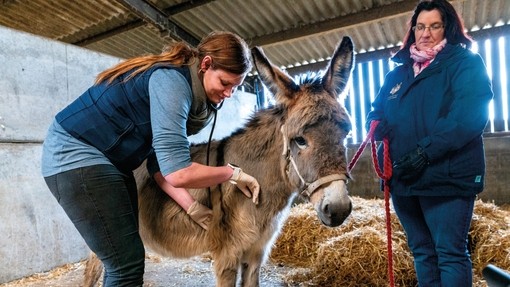What are the symptoms?
- A reduction or loss of appetite that may lead to hyperlipaemia
- A high temperature that may last for one to three days
- Harsh, dry cough
- Difficult breathing
- Clear, watery nasal discharge that may become thick and yellow or green
- Swelling of the lower limbs.
When should I vaccinate my donkey?
Your vet will advise you on when to give the initial course and will help you with booking in boosters.
Foals can start the primary course at around six months of age or, in certain circumstances, from four months.
Flu and tetanus vaccinations are available as a combined product, so your vet may be able to give your donkey one injection to cover both diseases.
Learn more about vaccinations, a safe and effective way of preventing disease and fighting infection in donkeys.




